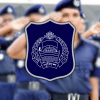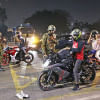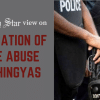Why we need democratic policing

There is no denying that the fall of an insensitive and autocratic regime in Bangladesh has been caused by a multiplicity of factors, prominent amongst which is the decay and incompetence of regulatory institutions, with the police being the most visible culprit. Why has the organisation failed to act in accordance with the spirit of our constitution? Why are the deficits in democratic policing so glaring?
Looking back, one would find that policing in the subcontinent, including Bangladesh, was modelled after the militaristic Irish constabulary rather than the civilian London metropolitan model. This was deliberately done by the British colonial rulers to subjugate large and hostile populations with a relatively small force. Such a force answered predominantly to the regime in power and its bureaucracy, not to the people.
Personnel in this arrangement naturally felt responsible for controlling populations rather than protecting the community, and sought to secure the interests of the dominant group. They were required to remain outside and distinct from the community and were extremely hierarchical in structure, where loyalty was directed towards leadership and establishment rather than the rule of law.
Curiously, all South Asian governments have largely retained this colonial structure of policing. No wonder, therefore, that there continues to be a strict hierarchical division between officers and constabulary throughout South Asia. The former are often well-educated and relatively well-paid, while the latter suffer from lamentable working conditions.
Democratic policing is a concept that has emerged in recent times to describe the characteristics of policing in a democracy, where the police serve the people of the country rather than the regime. In Bangladesh, the police need to serve and protect rather than impede freedoms. Our police should not concern themselves with people's beliefs or associates, their movements, or conformity to party ideology. It should not be too much to expect that our police remain primarily committed to preserving community safety and applying criminal law equally to all people, without fear or favour.
Democratic policing requires a normative framework for the organisation. It should provide a common reference point for civil society, policymakers, international partners, and the police itself. Our democratic police must be characterised by an orientation to serve society—transparency and accountability must permeate the organisation. Personnel in such an outfit must reflect the demographic make-up of the country and be insulated from undue political influence. In addition, they should be equipped with the skills to perform their tasks effectively and efficiently, exhibiting professionalism throughout the organisation.
These values must be considered non-negotiable, as without them, police organisations cannot be democratic in their structure, culture, or performance. A realisation must dawn that democratic policing is not just about maintaining law and order. It is about establishing and nurturing a healthy relationship with the community, based on mutual respect and understanding. The police must provide service as a means to uphold the law rather than using force to impose the law.
One may ask why we lacked democratic policing thus far despite having a republican constitution. The answer to this question lies in the fact that after independence, we retained colonial administrative, police, and judicial structures without adapting them to the changing situation. The "ruler supportive" character of our police emerged when the governing elite of a decolonised society decided to retain the inherited police organisation, ignoring justified demands for change.
A cynical view that cannot be entirely dismissed is that our politicians were attracted to the administrative and police system established by colonial powers and enjoyed exercising power and authority, disregarding their own demands for far-reaching administrative reforms. All political parties have exercised influence over police postings, promotions, and transfers, as well as the deployment of police during strikes, demonstrations, and elections. They did not want to professionalise the service, as control over it is central to political conflict in a divided society.
Additionally, the blanket power of superintendence vested in the government by the Police Act, 1861, is inappropriate in a democracy. And the role of intelligence agencies has not been redefined to protect the fundamental right to freedom of association, expression, and movement. The police in Bangladesh still monitor all political activities without discrimination, excluding only the ruling party of the day, which gives them authoritarian powers antithetical to the democratic spirit.
Under these circumstances, we need to define the contours of the political executive-police relationship. The powers and responsibilities of each entity must be properly articulated. A careful balance must be struck between legitimate supervision of the police by the political executive and illegitimate interference and influence. It is important to carefully define what superintendence means to ensure that the power of the executive is conditioned while allowing the police operational autonomy under the law.
At present, there is very little effective oversight of police conduct. For democratic policing to be meaningful, there must be transparent and functional external accountability mechanisms compliant with international best practices. And parliament should constantly oversee the effectiveness of policing.
Policing is a public responsibility wherein the powerless are often pitted against the powerful. The interplay between the public and the police is usually more immediate, intense, and frequent than interactions with the judiciary, other parts of the bureaucracy, or the political class. Therefore, without substantial reforms, policing will continue to undermine security and, consequently, our democratic foundation.
Muhammad Nurul Huda is former IGP of Bangladesh Police.
Views expressed in this article are the author's own.
Follow The Daily Star Opinion on Facebook for the latest opinions, commentaries and analyses by experts and professionals. To contribute your article or letter to The Daily Star Opinion, see our guidelines for submission.

 For all latest news, follow The Daily Star's Google News channel.
For all latest news, follow The Daily Star's Google News channel. 











Comments